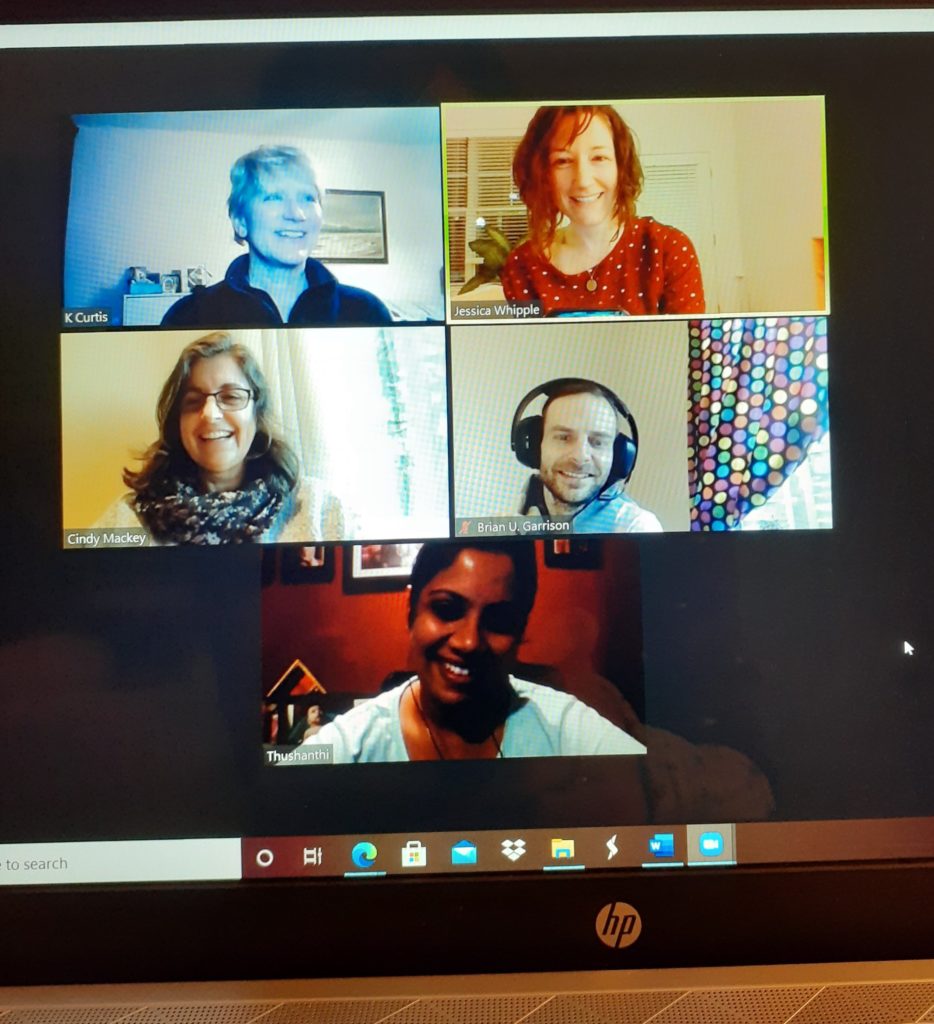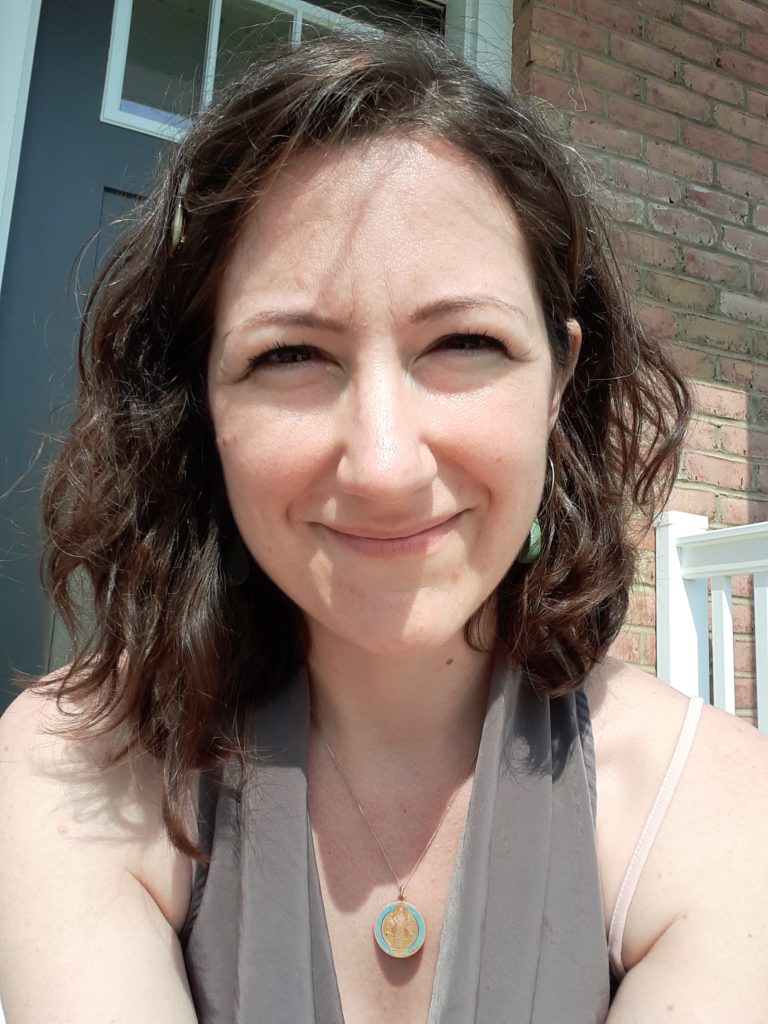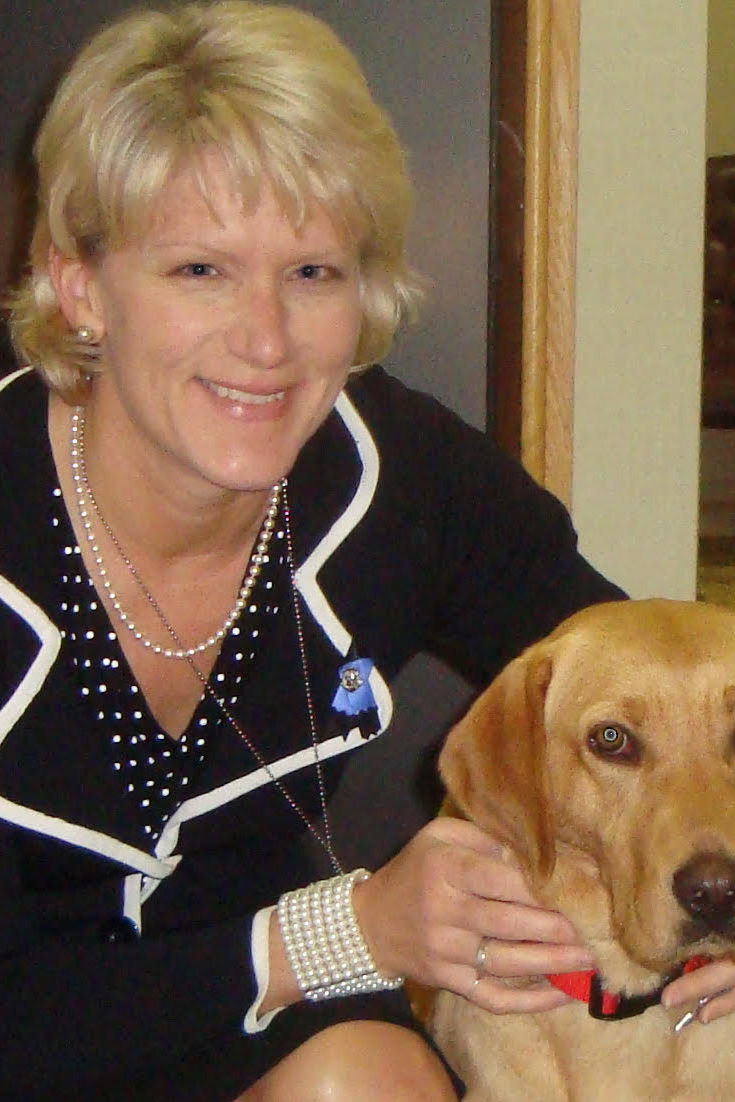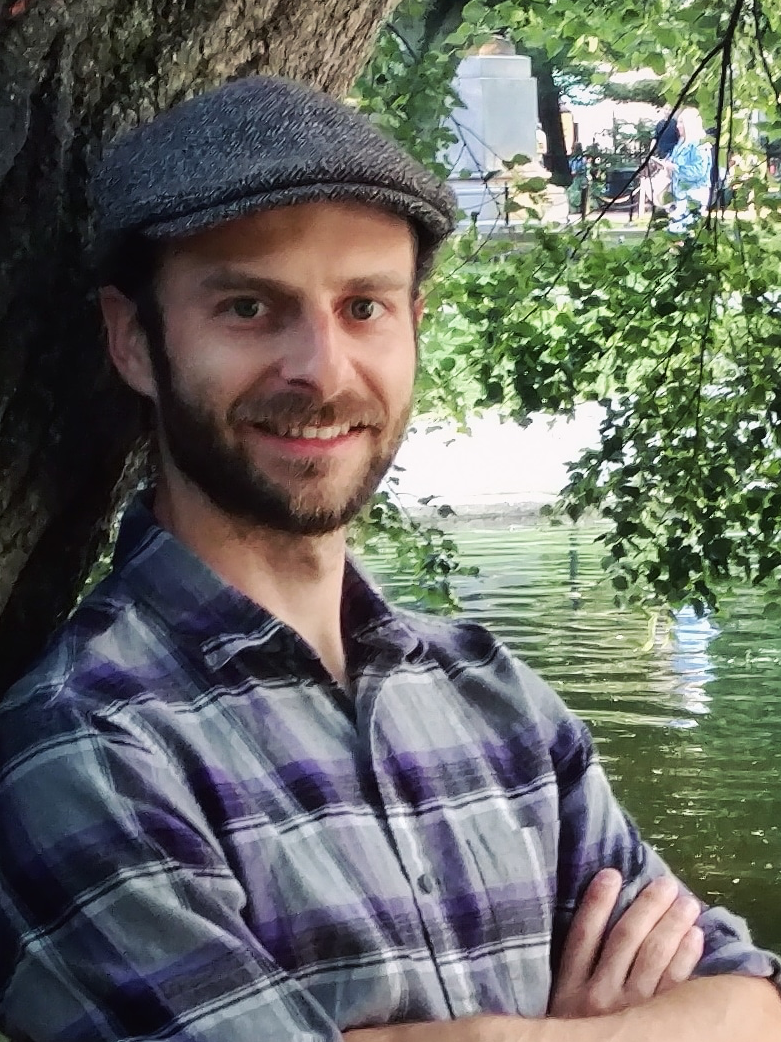One of the best things that happened to me as a writer was being invited to a critique group. I’m usually shy with new people (can you imagine?!) and having never lived out of Sri Lanka, I don’t have many foreign friends. I was apprehensive, and all those middle-grade feelings came up- will I fit in? Am I good enough? Will they like me?
Well, almost a year later I can happily say that the answer to all those questions was a yes. We all fit in perfectly (Brian doesn’t seem to mind that he’s the only guy!), and we all like each other (yay!). It is evident that a good critique group goes beyond just getting along. We not only give honest feedback but genuinely want each other to succeed. *SHAMELESS PLUG- WE ARE ALL LOOKING TO BE AGENTED AND ARE REALLY GOOD, HONEST!* Plus, it’s a whole lot of fun! Thanks again to Jessica who brought all of us together. Here’s to many more years of feedback and friendship!
As someone setting out to interview writers who inspire me, it would be amiss of me if I didn’t interview my wonderful CPs. Curious about how a critique group functions and the benefits of being in one? Read on!

Q: What was your experience with critique groups before this?
Jessica: I was part of a group in Pittsburgh that was led by our regional SCBWI head, but then we moved to Lancaster exactly one month before Covid hit. Because the Lancaster group wasn’t meeting in person (of course) I asked on Twitter if anyone wanted to join a zoom group with me.
Thushanthi: I was looking for a critique group and was engaging with other picture book writers on Twitter and that was how I connected with Jessica (she had posted a pretty picture from her walk that morning and I commented on it!). I was lucky that Jessica approached me directly! One of their initial group had to step out and she was looking for a fill-in.
Cynthia: In 2017 and 2018, I joined Julie Hedlund’s 12×12 Picture Book Challenge. Our 2017 group swapped manuscripts all year and then disbanded. In 2018, I joined a new group that had a few members who were just beginning to get established as writers and/or illustrators. In 2020, 4 out of six members released new picture books, 3 traditionally published and one self-published (me), and two out of six are now agented. We continue to swap manuscripts but much less often now.
Karyn: This is my first critique group, so I can’t really compare it with others. That said, I love this group!
Brian: I had taken a workshop style college class, but as an adult writer, my first critique experience was with a group of poets. After our monthly meeting, we would split into groups that were a different mix of people each time. Even if I wound up in the same group with someone a few times, they always had a different poem to share. I have participated in other groups since then, but only locally and meeting in-person.
Q: What do you feel are the most important aspects of a critique group?
Jessica: Regularity, because we are committed to meeting, reading, and responding to each other’s work, and staying focused during meetings! Regularity keeps us accountable. Consensus is also important, but on the flip side, subjectivity: Consensus because I can see if one or more people interpret a sentence a certain way then that points out something to work on, and subjectivity because maybe I don’t NEED to work on that thing. It helps me to identify the changes that are just for preference and allows me to let go of some of the issues that I get stuck on because I can chock them up to matters of opinion.
Thushanthi: Holding each other (gently) accountable. There have been times I didn’t have anything to share and the others would urge me to share even an imperfect first draft. I also think it’s important to have the same group of CPs see your story progress. They know the story almost as well as you do and can cheer you on towards making it the best version possible.
Cynthia: I think you need a certain level of commitment and desire to promote each other’s success. Regular meetings and honest feedback are equally important to me. I think it is also important to really try to understand the essence of each other’s work.
Karyn: Ultimately, the point of a critique group is to strengthen our work. We are all very invested in each other’s work, and genuinely want it to succeed.
Brian: Hearing outside perspectives! It’s invaluable to know when something that works in my head isn’t coming across on the page, or when it DOES come across on the page and just doesn’t work for others.
“I sometimes get lost in the corrections, and have to consciously remind myself to comment on aspects of a story that are working for me as a reader or where I think That’s awesome!”
Brian
Q: What do you look for in a critique partner?
Jessica:I’m especially grateful for critique partners who challenge me and are willing to show me weaknesses in my writing. I look for CPs who aren’t afraid to point out blind spots, but who don’t sugar-coat their comments. An equal balance of positive and constructive comments really helps me believe they know what they’re talking about, and if they are being honest.
Thushanthi: Honesty! I need them to tell me what doesn’t work. As a diverse writer, I also look forward to knowing which parts resonate with them as it’s important that my writing is relatable to as many people as possible.
Cynthia: Personally, I appreciate someone who is positive and yet honest, someone who can see the essence of your story (even if a bit unclear) and ask the tough questions that help you elevate the story to its highest level. And someone who genuinely wants the success of all group members.
Karyn: My ideal CP is confident about giving and receiving honest, considered feedback, as it’s always done in a constructive, supportive fashion
Brian: I particularly appreciate openness and honesty. If a story doesn’t appeal to my CPs, it’s helpful for me to know that. With an open conversation, we can find whether it’s just a difference of preferences or whether some adjustments might make the story appeal to a wider audience.
Q: What is your critiquing style?
Jessica: I don’t know that I have a style, but I do know that I sometimes have trouble being tactful! Sometimes to the detriment of the writer, I feel like I can cut too quickly to the point without using the “sandwich method.” This isn’t so much a style as it is a weakness!
Thushanthi: As a perfectionist, I tend to always look for areas that need improvement. I tend to comment less on the parts that work, and I remind myself that this is important too. I like to think that my CPs know it’s a given that I’m a fan of their work!
Cynthia: I try to stay positive and ask pertinent questions. I also try and share resources and information that might support the writer in getting to a more polished piece of writing. I ask myself what story the writer is trying to tell and tailor my questions to enhance that story.
Karyn: I read pieces through multiple times, looking for different things with each pass. As a former editor, I tend to get distracted by shiny things like typos and tense changes, and have to get that out of my system before I can give the piece a more in-depth, comprehensive look. I also try to see the piece as a small child would, and imagine their reaction.
Brian: I tend to focus on the small details that bring precision and texture. Word choice is a big piece of that with pointing to opportunities for vivid verbs, offering sentence tuneups, and thinking about which words and phrases fit the feel of the story. I sometimes get lost in the corrections, and have to consciously remind myself to comment on aspects of a story that are working for me as a reader or where I think “That’s awesome!” I hope I don’t come across as a curmudgeon too frequently!
Q: What do you get drawn to the most in picture books?
Jessica: I love the interplay between words and images.
Thushanthi: The simplicity. The minimal text that somehow can magically contain so much depth. The images that draw and capture the reader.
Cynthia: A great character arc, lyrical writing, humour, and voice. I like picture books that can be read aloud and enjoyed by a group. I guess if I have to choose one thing it’s the poetic aspect that draws me in.
Karyn: I enjoy sly, clever and unexpected humour, and wordplay, like that of Tara Lazar or Jon Klassen. There’s nothing better than sitting with your arms around your kids, reading to them, and all of us cracking up. My kids are in their teens now, and still quote favourite lines from books we read together. I love the thought of my books providing memories like this for others
Brian: Picture books are inherently more accessible, and you have a captive audience. As much as I love poetry and poets, we sometimes fall prone to the artistic approach that says, “Even if nobody alive understands, it will be uniquely my distinctive art.” But, I want readers, and I want what I write to have an impact. Even just creating a story that sparks joy and interest is useful in creating a reader and promoting literacy. This is part of the additional appeal that draws me to picture books and children’s poetry.
“Each of us brings a slightly different perspective and area of expertise to the group, and all of these skills combined help make our work sing.”
Karyn
Q: Your favourite part about our meetings is?
Jessica: Me-time! It’s two hours when I can geek-out and just think about writing. My husband puts the kiddos to bed and I can take as long as I need. Because of the pandemic and it being winter, there isn’t really any wise way to spend time one-on-one with other adults. I look forward to this every week!
Thushanthi: The familiarity. After nearly a year together, I’d like to think we are friends and not just ‘writing buddies’. I think it’s important to have these solid connections in what can be a fluctuating career. I also love hearing about what my CPs across the world are experiencing, whether it’s weather, or politics, or traditions- it’s all unique to me!
Cynthia: So many things! I love that we span 3 time zones and everyone still has the commitment to meet. I’m the kind of person who puts A LOT of energy into what I do so if I only have one focus, like teaching; that’s a bad thing. I get too wrapped up in it all. And I love it that we meet bi-weekly, keeping me on track with writing, revising, and sending work out. And then I also love listening to other people’s thoughts on the work; we all come from a unique perspective and each of us brings something to the group, some are better at voice, rhyme, character development, plotting, or world-building but together we touch on all of that.
Karyn: I really enjoy our meetings! One of my favourite parts is our “ice-breaker” questions, where we all share stories or memories. We’ve discussed myriad things, such as favourite museums, what we see out our front doors, show and tell, and much more. We don’t need them anymore as we’ve been together almost a year and know each other quite well, but we all have fun with them. I also love the fact that we are scattered all over the world, and can still connect face to face.
Brian: I enjoy getting to know, connect with, and become friends with my fellow writers. Also, it’s how we improve. By spending time together, we can do better at the being alone part of writing, which means we have another excuse (fresh words) to gather again!
Q: How has being a part of the group helped you?
Jessica: It has kept me writing! And it has challenged me not to give up on a draft too soon, and not to assume a draft is done before it really is submittable.
Thushanthi: It helps me not to get into slumps. I work best on deadline! I make sure I have something new to share, even if it’s a revision of a story they’ve seen before.
Cynthia: I’d say the group has helped me identify areas of my writing that are strong and other areas that could be improved. I have a more general idea now of my own strengths and weaknesses as a writer. This group has helped me stick with the writing habit at times when I’ve had a lot of distractions in my life that could take me off the path to publication. It keeps me focused and working towards my goals, even if it is slow progress; it is still progress!
Karyn: So many ways! Each of us brings a slightly different perspective and area of expertise to the group, and all of these skills combined help make our work sing. We share resources and tips, find comp titles, learn about contests and events, and generally support each others’ efforts. Writing is hard and solitary, and it’s comforting to know your friends have your back—even if they’re half a world away!
Brian: With this group, I like getting to see the same story a few times. It’s instructive to see the revision process in action, and it emphasizes the fact that the writer has the final say. Every story could be written a zillion different ways, and the version that each partner writes is uniquely their own.

Jessica Whipple writes for adults and children from her home in Lancaster, PA USA. She is a DIY contributor to Wildflowers, a creative magazine for girls (WildflowersGirlsMag.com). She has contributed to Highlights and is a reader for Ember, a journal of the Empire and Great Jones Little Press (Emberjournal.org). She is a member of SCBWI and Storyteller Academy and is seeking representation for her picture book manuscripts. You can follow her on Twitter @JessicaWhippl17 or check out her website at AuthorJessicaWhipple.com

Cynthia Mackey has been a member of SCBWI since 2015 and has always loved picture books. She’s been writing for children for about 6 years. She has two self-published fiction picture books: THE LULLABY MONSTERS (2020) and KATIE SHAEFFER PANCAKE MAKER (2017). Cindy’s stories are lyrical, sweet, and satisfying. A nature preschool teacher from British Columbia, Canada, many of her stories draw from the natural environment and the children she teaches. Her goal is to become traditionally published. www.authorcynthiamackey.com

Karyn Curtis is a former editor and columnist and has worked in communications, publishing, and speechwriting. Her essay, “A Real Runner,” was published in Chicken Soup for the Soul – Running in 2019. She is a member of the SCBWI and two critique groups. She has a B.A. (Hons) in Communications and Psychology. She grew up riding horses and often writes about them. She lives with her very patient husband, two children, and two cats, one of which is quite unruly. When not wrangling kids and cats, she can be found scarfing chocolate and sometimes running.

Brian Garrison‘s poetry for adults is online, in print magazines, and his chapbook, New Yesterdays, New Tomorrows. His kidlit writing appears in ASK Magazine and The Caterpillar Magazine. He serves as Secretary for the Science Fiction and Fantasy Poetry Association, and is a member of the SCBWI and Willamette Writers. Find more at www.bugthewriter.com


This sounds like an ideal critique group! You all sound so committed to your writing, and to each other. I would have never published the books I’ve had without my two critique groups (both have been meeting for over twenty years). I hope that each of you will soon be celebrating with your own publishing successes!
I hope so too! Thank you reading, David 🙂